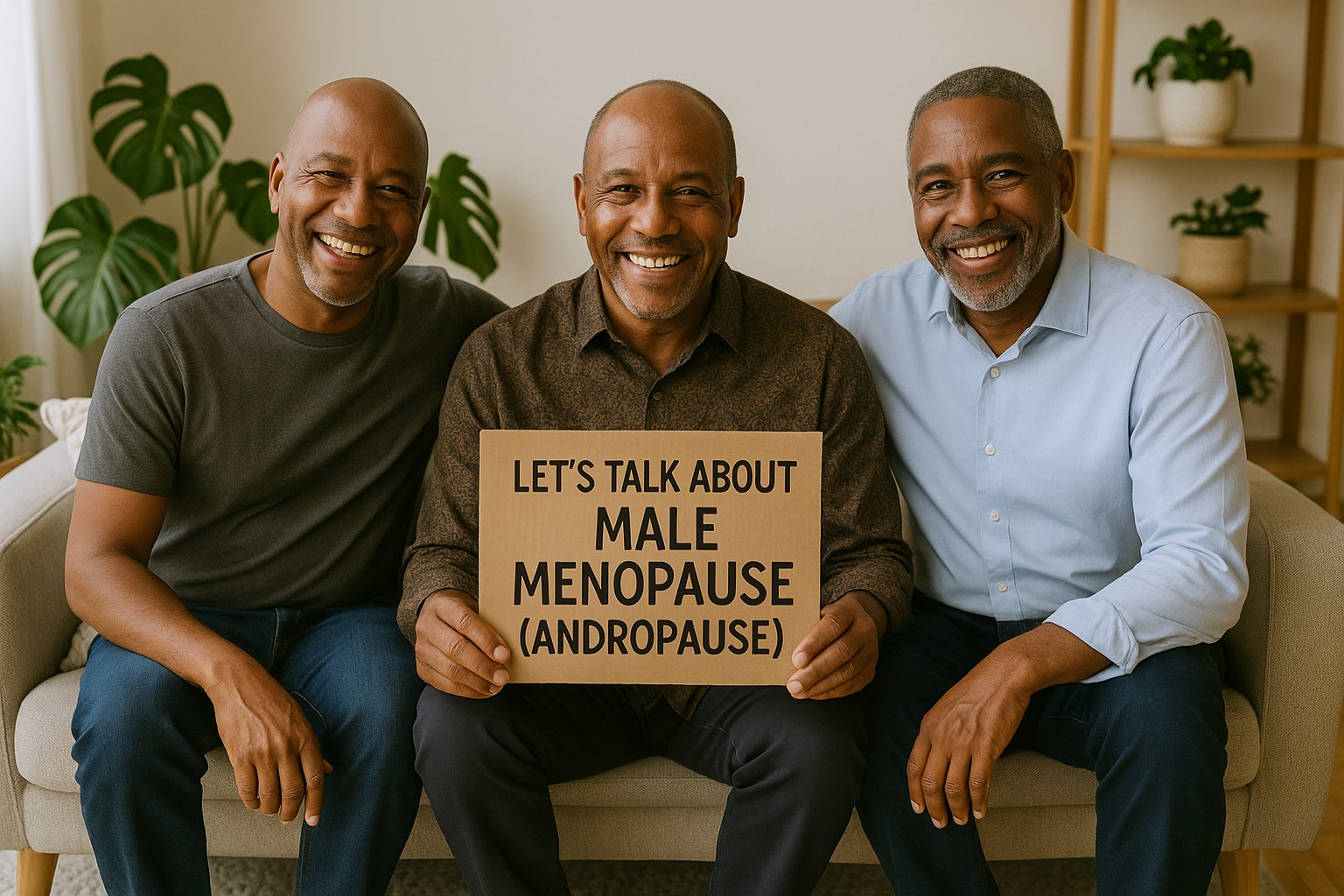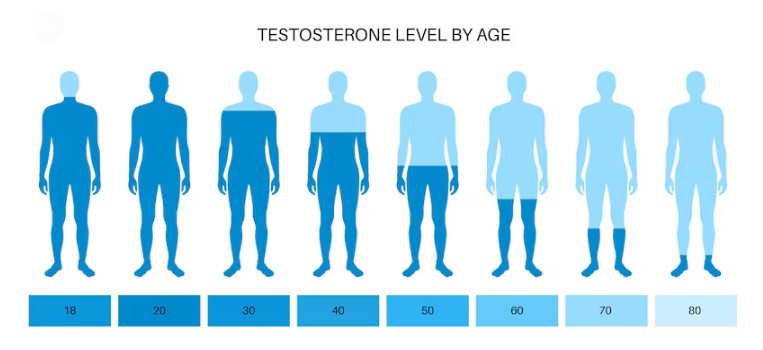Male Menopause (Andropause) Explained to Africans: Causes, Symptoms, Treatment, and Myths
By: Foluke Akinwalere. Health & Wellness Writer. Medical reviewed by Tii N. Munghieng, MD.

Image of three smiley African men of menopausal age in casual wear seated on a three-seater sofa chair with large and small potted plants in the background. One of them (centrally seated) holds a small-sized cardboard sign saying “Let’s talk about male menopause”. (Image from ChatGPT).
In many African cultures, aging is associated with wisdom, honor, and respect, especially for men. However, a silent health challenge that affects many aging men across the continent is rarely discussed: Male Menopause, medically known as Andropause.
Unlike female menopause, which is widely recognised and supported in African communities, male menopause remains largely misunderstood, ignored, or dismissed altogether. Many African men may silently struggle with symptoms like fatigue, low sex drive, mood swings, and depression, often attributing them to spiritual attacks, stress, or even personal weakness.
But male menopause is real. Learning about it could improve not just the health of African men, but also the quality of their relationships, work performance, and family life.
This article explains the causes, symptoms, diagnosis, and treatment of male menopause in simple terms, while also addressing cultural myths and misinformation that often prevent African men from seeking help.
Male menopause (or Andropause), is an age-related hormonal change in men. It refers to the gradual decrease of testosterone—the hormone responsible for male sexual development, muscle mass, mood, and energy in men – with age (see fig. 1).

Fig. 1: Testosterone level in men by age. Image from: Freepik. Click on image to enlarge
According to American College of Physicians, men typically undergo gradual decrease in testosterone levels as they get older, beginning around their mid-30s, with an average decline of about 1 percent per year. [1] A study also calculated that at the age of 75 years, a man will have lost about 30% of the testosterone he had at the age of 25 years. [2]
While it’s not as abrupt as menopause in women (which involves a sudden drop in estrogen and progesterone, hormones that control menstruation in a woman), male menopause usually starts in the 40s or 50s and progresses slowly with age.
Medical experts refer to this condition as Late-Onset Hypogonadism or Androgen Deficiency in the Aging Male (ADAM). But to put it simply, it's what happens when a man’s testosterone level starts dropping naturally as he ages, and brings with it a range of physical, emotional, and sexual changes—though not all men may experience these changes in the same way.
Several factors can contribute to the cause of male menopause such as:
The main cause of male menopause or andropause is the natural drop in testosterone levels that begins around age 40 and continues with age. As a man ages, testosterone levels gradually decrease, leading to both physical and emotional changes.
3. Lifestyle factors
Possible lifestyles cause of male menopause include:
What Are the Common Signs and Symptoms of Male Menopause?
Figure 2: Symptoms and signs of male menopause (Andropause). Click on image to enlarge.
The signs are often subtle at first and may be mistaken for other health problems or simply “getting old.” The common signs and symptoms (fig. 2) include:
It’s important to note that the severity of these symptoms can vary. Also, some of these signs and symptoms can be caused by other medical conditions, so it’s important to consult with a healthcare professional for proper diagnosis and treatment.
The diagnosis of male menopause is based on a combination of reported symptoms, physical examination and blood tests to measure testosterone levels. When you are experiencing several of the symptoms of male menopause, it’s time to see a doctor.
The doctor will ask you for what brought you in, ask several question about your condition, ask about your past medical history, family and social history, and the medications that you are taking, etc.
The questions your doctor may ask about your medical and social history may include:
These questions help the doctor to understand if your symptoms are from low testosterone or something else.
After taking your history, your doctor will then check your body, your weight, blood pressure, and any visible signs like swollen breast tissue or belly fat, etc.
Testosterone levels are highest in the morning, so the doctor may order a blood test between 7-10 a.m. to check your hormone levels. [9] Repeat testosterone testing is often needed to confirm low levels because they fluctuate.
Sometimes, other health problems like diabetes, obesity, high blood pressure, thyroid disease, or depression can cause similar symptoms. You may be tested for these as well to exclude them.
If your symptoms are complicated, or your testosterone level is very low, your doctor may refer you to:
Getting tested can bring peace of mind and a clear plan for treatment. Ignoring your symptoms can lead to worse health issues like:
The earlier you find out, the easier it is to start managing it with lifestyle changes, counseling, or medication.
The choice of treatment depends on the severity of your symptoms and health status.
Making healthier choices can significantly improve your symptoms:
Regular physical activity, especially cardio (aerobic exercise) and strength training can help maintain your muscle mass, bone density, and improve energy levels.
A balanced diet with adequate protein, healthy fats, complex carbohydrates, and hydration can support hormone production and your overall health.
Techniques like mindfulness, meditation, or yoga can help reduce stress, improve your hormone levels and improve your symptoms.
Ensuring adequate and restful sleep is crucial for hormone regulation and can improve mood.
Reduce alcohol intake and quit smoking.
Testosterone Replacement Therapy (TRT) can be used to treat symptoms associated with low testosterone.
The goal of the therapy focuses on two main areas: relieving symptoms and restoring normal body functions.
Symptom relief may include better sexual health, increased physical activity, improved mood, and enhanced quality of life. Restoring body functions involves improving bone density, muscle strength, body composition, and cognitive performance—areas that may have been negatively affected by low testosterone levels. [10]
TRT can be administered through:
TRT is not suitable for everyone and carries potential risks with side effects. It’s important to consult with a healthcare professional to determine if TRT is appropriate for you. Discuss potential risks and benefits before starting treatment.
These include:
Talking to a counselor or psychologist may help you manage emotional or mental health symptoms such as depression or anxiety.
Conditions like diabetes or cardiovascular disease can contribute to symptoms and require specific management.
Regardless of the treatment approach, regular check-ups with a doctor are important to monitor symptoms and manage any potential side effects.
In many African cultures, there are common misunderstandings about male menopause (andropause), and this can prevent proper awareness and care. These false beliefs often arise from limited knowledge, lack of open conversations, and traditional views on aging and masculinity.
Common myths include:
Myth: Only women have menopause
Truth: Men also experience hormonal changes. Though different from female menopause, the effects on health are real and should not be ignored.
Myth: Male menopause is not a real condition
Truth: While male menopause is different from female menopause, it is a real medical condition. As men age, the low testosterone levels lead to symptoms that affect physical, emotional and sexual health.
Myth: Symptoms are just a normal part of aging
Truth: While aging does bring some changes, symptoms like constant fatigue, low sex drive, mood swings and loss of muscle mass can be linked to low testosterone. These are not just “normal” signs of aging and can be treated when properly diagnosed.
Myth: “Seeking help is a sign of weakness”
Truth: Seeking medical advice for changes in health is a sign of strength and self-care. Hormonal imbalances can affect a man’s quality of life, and addressing them can lead to better physical and emotional wellbeing.
Myth: “Taking herbal mixtures will solve everything”
Truth: Many herbal remedies are untested and can interact negatively with medications or worsen symptoms. Professional advice is better.
Myth: “Real men don’t get tired or weak”
Truth: This toxic masculinity prevents men from seeking help. Fatigue and weakness can be signs of underlying health issues—not weakness of character.
Conclusion
Male menopause is real. It’s not a curse, weakness, or shameful secret. It’s a hormonal transition that all men experience—usually in silence. The good news is that with adequate and appropriate health education, you can have a better understanding of how and why it happens, and live a good quality life as you age.
Breaking the silence around male menopause is essential to improving the well-being of men across Africa.
Related
Male Infertility in Nigeria: Causes, Symptoms, Diagnosis and Treatment
Why African Men Need Regular Health Checks, Screenings
Erectile Dysfunction in Nigerian Men
Published: July 6, 2025
© 2025. Datelinehealth Africa Inc. All rights reserved.
Permission is given to copy, use, and share content freely for non-commercial purposes without alteration or modification and subject to source attribution.
DATELINEHEALTH AFRICA INC., is a digital publisher for informational and educational purposes and does not offer personal medical care and advice. If you have a medical problem needing routine or emergency attention, call your doctor or local emergency services immediately, or visit the nearest emergency room or the nearest hospital. You should consult your professional healthcare provider before starting any nutrition, diet, exercise, fitness, medical or wellness program mentioned or referenced in the DatelinehealthAfrica website. Click here for more disclaimer notice.